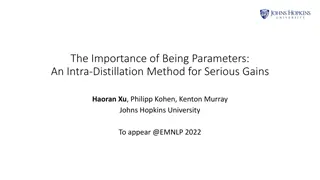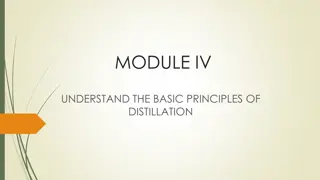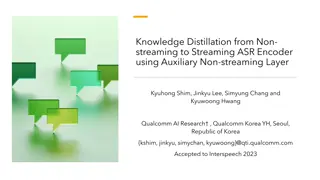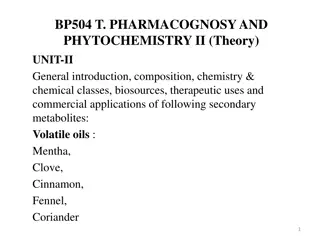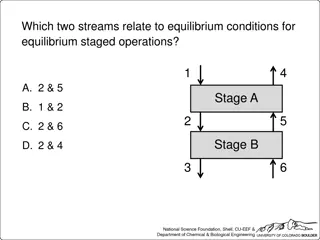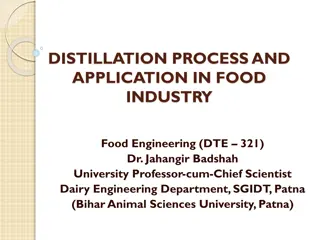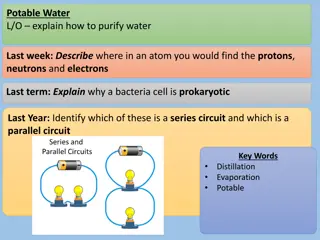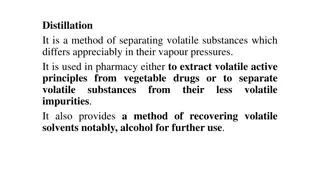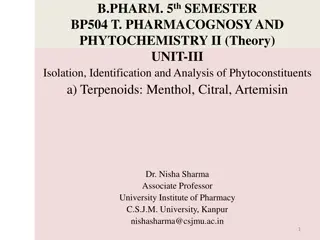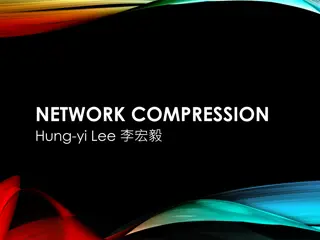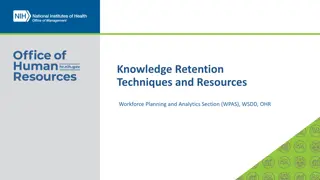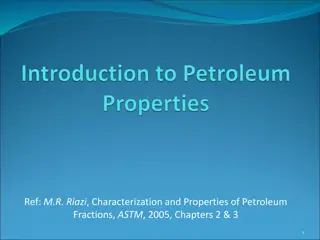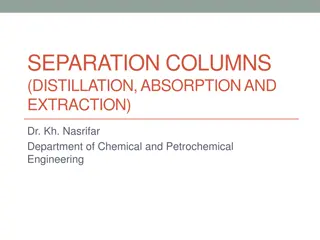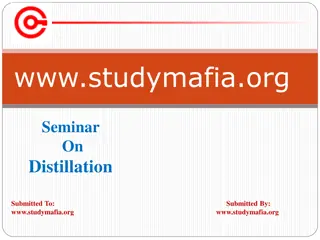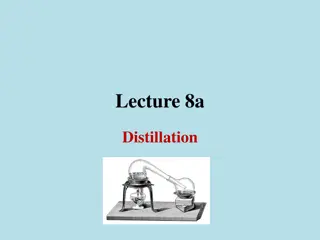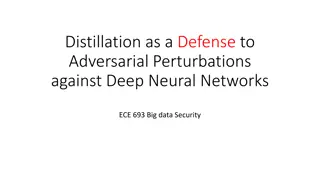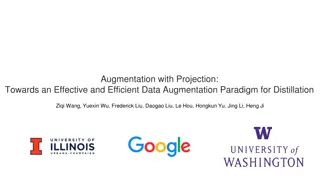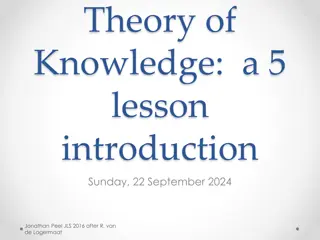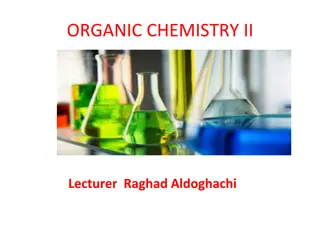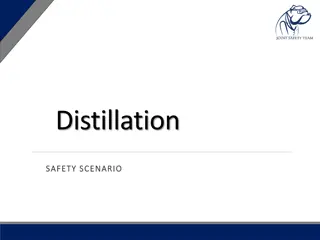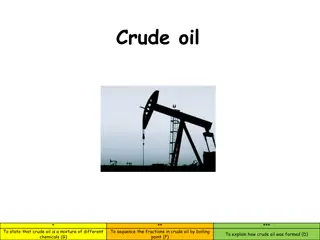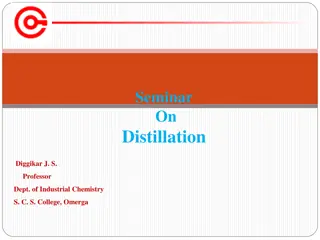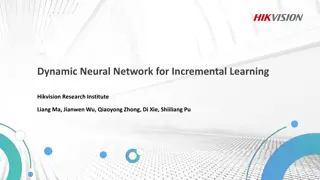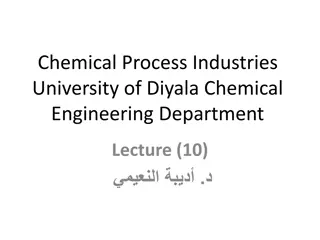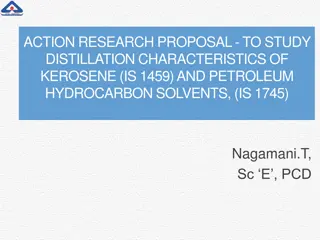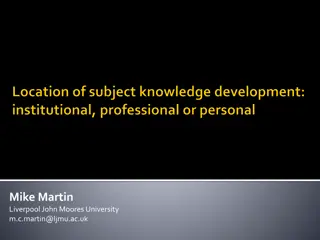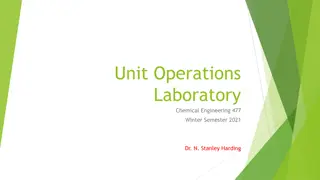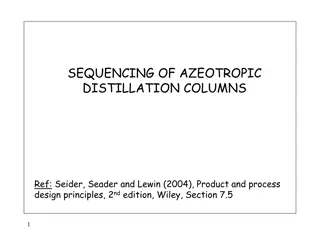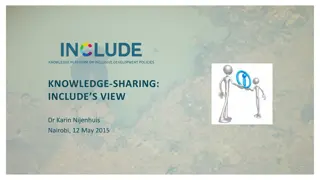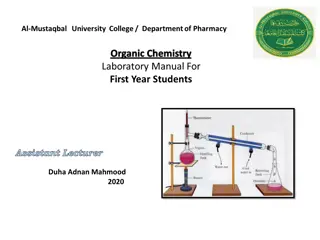SEPARATION COLUMNS
Azeotropic distillation plays a crucial role in the efficient recovery and recycle of organic solvents in the chemical industry. It addresses the challenges posed by azeotropes in separation processes, offering methods like pressure swing distillation and extractive distillation. Understanding the t
0 views • 9 slides
Knowledge Capture
Knowledge capture is crucial for organizations to retain valuable expertise and prevent loss of critical knowledge due to employee turnover. Tacit and explicit knowledge play key roles, requiring strategic planning for retention, incentivizing knowledge-sharing culture, and implementing effective st
0 views • 6 slides
Understanding Knowledge Management: Processes and Frameworks 2. In knowledge management, organizations create, share, and manage knowledge to enhance performance. It involves acquiring different types of knowledge through various means, such as perc
Knowledge Management, Organizational Objectives, Types of Knowledge, Tacit Knowledge, Explicit Knowledge
1 views • 17 slides
Intra-Distillation for Parameter Optimization
Explore the concept of parameter contribution in machine learning models and discuss the importance of balancing parameters for optimal performance. Introduce an intra-distillation method to train and utilize potentially redundant parameters effectively. A case study on knowledge distillation illust
8 views • 31 slides
Understanding the Basic Principles of Distillation
Distillation is a process used to separate components in a liquid mixture based on differences in vapor pressures. This involves techniques like simple, steam, and fractional distillation, as well as understanding binary mixtures, boiling points, vapor pressures, and vapor-liquid equilibria. Raoult'
5 views • 42 slides
Knowledge Distillation for Streaming ASR Encoder with Non-streaming Layer
The research introduces a novel knowledge distillation (KD) method for transitioning from non-streaming to streaming ASR encoders by incorporating auxiliary non-streaming layers and a special KD loss function. This approach enhances feature extraction, improves robustness to frame misalignment, and
0 views • 34 slides
Volatile Oils in Pharmacognosy and Phytochemistry: Composition, Chemistry, Uses
Volatile oils, also known as essential oils, are derived from terpenes and their oxygenated compounds. These oils possess characteristic odors and are extracted from plants through various methods like hydro-distillation and steam distillation. They are commonly used as flavoring agents, perfumes, a
0 views • 29 slides
Distillation Column Operations and Equilibrium Conditions
Explore various aspects of distillation column operations, including equilibrium and operating conditions, total condenser setups, feed stage mass/energy balances, McCabe-Thiele solutions, and limiting operating conditions. Learn about vapor/liquid efficiencies and the relationships between differen
2 views • 40 slides
Distillation Process and Applications in Food Industry
Distillation is a separation process used in the food industry to separate components in a mixture based on their volatility. It involves vaporization, condensation, and re-evaporation to achieve separation. Steam distillation is a method where steam is used to reduce boiling temperatures for safe s
1 views • 13 slides
Distillation Process for Purifying Water
Distillation is a method used to purify water by separating it from impurities through evaporation and condensation. It involves heating the water until it evaporates, then cooling the vapor to collect the purified water. This process ensures the removal of harmful substances and microbes, resulting
1 views • 11 slides
Distillation: A Method for Separating Volatile Substances
Distillation is a method used in pharmacy to extract active principles, separate substances, and recover solvents. Simple distillation involves vaporizing a liquid, condensing the vapors, and collecting the liquid. It is commonly used for separating liquids from non-volatile solids under atmospheric
1 views • 69 slides
Isolation and Analysis of Terpenoids: Menthol, Citral, Artemisin
Menthol, Citral, and Artemisin are important terpenoids commonly found in plants like Mentha species. The isolation methods involve hydro-distillation and steam distillation, resulting in the extraction of these valuable compounds for various pharmaceutical applications.
0 views • 21 slides
Network Compression Techniques: Overview and Practical Issues
Various network compression techniques such as network pruning, knowledge distillation, and parameter quantization are discussed in this content. The importance of pruning redundant weights and neurons in over-parameterized networks is highlighted. Practical issues like weight pruning and neuron pru
0 views • 37 slides
Effective Knowledge Retention Strategies in Workforce Planning and Analytics
Retaining knowledge is crucial for organizations to enhance customer service, foster innovation, improve efficiency, and bridge skill gaps. This article explores the significance of knowledge retention, the types of knowledge essential for succession planning, and two effective strategies - the Know
1 views • 10 slides
Understanding Petroleum Fraction Distillation Curves
Characterization and properties of petroleum fractions are essential for understanding their behavior, particularly through distillation curves. These curves depict the boiling points of crude oil or petroleum fractions, highlighting components' volatility ranges. Various methods like ASTM D86, True
0 views • 28 slides
Overview of Distillation: Methods and Applications
Distillation is a crucial process for purifying liquid organic compounds by converting them to vapor and then back to liquid through condensation. This process is vital for various applications, including the separation of different liquids based on their boiling points. Distillation methods such as
0 views • 10 slides
Distillation in Practice: Making Ribena
Explore the process of making Ribena, a popular blackcurrant drink, through the lens of distillation. Learn how distillation is used to separate blackcurrant juice from skins, remove water, and collect aroma particles to create the final beverage. Engage with key concepts of distillation and filtrat
7 views • 4 slides
Understanding Separation Columns in Chemical Engineering
Explore the world of separation columns including distillation, absorption, and extraction, along with empirical correlations, minimum number of stages, Fenske equation, Underwood equation, Kirkbride equation, examples, and solutions presented by Dr. Kh. Nasrifar from the Department of Chemical and
5 views • 15 slides
Comprehensive Guide to Distillation: Types, Applications, and Advantages
Distillation is a widely-used method for separating mixtures based on differences in boiling points. This comprehensive guide covers the introduction, types of distillation, applications, advantages, disadvantages, and concluding remarks. Learn about simple distillation, fractional distillation, ste
0 views • 18 slides
Preparation Methods and Uses of Aromatic Water in Pharmacy
Aromatic water is a liquid pharmaceutical preparation containing volatile oils or essential oils. It is used as a pleasant medium for administering water-soluble drugs. Various preparation methods include distillation, solution, alternate solution, and dilution methods. Distillation method is used f
2 views • 17 slides
Understanding Distillation: Methods and Factors Affecting Boiling Points
Distillation is a process used to separate liquids based on their boiling points, with methods like simple, fractional, vacuum, and steam distillation. The boiling point of a compound is influenced by factors such as molecular weight and functional groups, where higher weights and polar groups lead
1 views • 15 slides
Understanding Distillation: Boiling Points and Factors
Distillation is a process of vaporizing and condensing liquids to separate components based on boiling points. This method utilizes differences in boiling points of liquid mixtures to achieve separation. Factors influencing boiling points include molecular weight, functional groups, and intermolecul
0 views • 16 slides
Distillation as a Defense Against Adversarial Perturbations in Deep Neural Networks
Deep Learning has shown great performance in various machine learning tasks, especially classification. However, adversarial samples can manipulate neural networks into misclassifying inputs, posing serious risks such as autonomous vehicle accidents. Distillation, a training technique, is proposed a
3 views • 31 slides
Effective Data Augmentation with Projection for Distillation
Data augmentation plays a crucial role in knowledge distillation processes, enhancing model performance by generating diverse training data. Techniques such as token replacement, representation interpolation, and rich semantics are explored in the context of improving image classifier performance. T
0 views • 13 slides
Exploring Epistemology: Understanding Knowledge and Truth
Epistemology delves into the nature of knowledge, understanding, wisdom, and justification, questioning the extent of human knowledge and the different kinds of knowledge. It explores skepticism and conditions on propositional knowledge, discussing whether knowledge implies truth and the debate betw
1 views • 54 slides
Navigating the World of Big Data, Knowledge, and Crowdsourcing
The world has evolved into a data-centric landscape where managing massive amounts of data requires the convergence of big data, big knowledge, and big crowd technologies. This transformation necessitates the utilization of domain knowledge, building knowledge bases, and integrating human input thro
1 views • 5 slides
Exploring the Nature of Knowledge in Theory of Knowledge
Delve into the essence of knowledge with Jonathan Peel's introduction to Theory of Knowledge, pondering on how different disciplines perceive knowledge, the impact of empirical questioning, and timeless wisdom on ignorance and progress. Explore the concept of basic knowledge and its implications, in
0 views • 37 slides
Organic Chemistry II Lecturer Raghad Aldoghachi - Laboratory Safety Rules and Distillation Techniques
Explore the world of organic chemistry with Lecturer Raghad Aldoghachi through laboratory safety rules emphasizing following instructions, chemical safety, and appropriate attire. Learn about hazard symbols, organic compound studies, distillation as a separation method, purification of liquid organi
0 views • 17 slides
Understanding Modelling Knowledge and Knowledge Representation
Explore the significance of modelling knowledge through knowledge representation, making it explicit, independent, and reusable. Learn why knowledge representation is essential and how it facilitates exchange, query, inference, and visualization. Delve into examples of knowledge application in vario
0 views • 30 slides
Distillation Safety Scenario: Handling a Cracked Round Bottom Flask
In this distillation safety scenario, you face a cracked round bottom flask leaking amine. Immediate actions involve unplugging the heat source, containing the material, turning on emergency exhaust, and alerting others to evacuate. Preventative measures such as checking for cracks, proper stirring,
0 views • 4 slides
Understanding Crude Oil and Fractional Distillation Process
Crude oil is a mixture of various chemicals formed from the decomposition of microscopic plants and animals. Through fractional distillation, the fractions in crude oil are separated based on boiling points to obtain products like petrol, diesel, and lubricating oil. The process involves heating the
0 views • 15 slides
Understanding Distillation: A Comprehensive Overview
Distillation is a crucial separation technique used in chemistry to purify materials by separating liquids with different boiling points. This process involves simple and fractional distillation methods, each with specific steps and applications. The article discusses the importance, advantages, and
0 views • 13 slides
Dynamic Neural Network for Incremental Learning: Solution and Techniques
Addressing the challenge of incremental learning, this research presents a Dynamic Neural Network solution that enables training without previous data. The approach focuses on fast learning, reduced storage and memory costs, and optimal performance without forgetting past knowledge. Techniques such
0 views • 10 slides
Chemical Engineering Processes at University of Diyala
The Chemical Engineering Department at the University of Diyala covers various processes in the chemical industry, including hydrogenation, energy consumption, butylene production sources, classical methods like absorption and distillation, as well as butadiene extraction. The application of these p
0 views • 18 slides
Study of Distillation Characteristics of Kerosene and Petroleum Solvents
This research proposal aims to investigate the distillation characteristics of Kerosene (IS 1459) and Petroleum Hydrocarbon Solvents (IS 1745) to differentiate between them. With overlapping boiling points, it is crucial to determine the 50% and 95% volume recovery temperatures in both standards to
0 views • 11 slides
Understanding Subject Knowledge Development in Education
Exploring the complexities of subject knowledge development in education, this study delves into areas such as students' existing knowledge, competencies, and the role of institutions in shaping knowledge acquisition. The focus lies on personalizing knowledge to individual needs rather than a fixed
1 views • 22 slides
Unit Operations Laboratory Chemical Engineering Winter Semester 2021
Dr. N. Stanley Harding, a seasoned Chemical Engineering professional, introduces the Chem. Eng. 477 Unit Operations II course focusing on transferring theoretical knowledge to practical experience. The laboratory experiments cover various engineering principles such as separations, continuous distil
0 views • 13 slides
Understanding Azeotropic Distillation Sequences in Chemical Engineering
Azeotropic distillation columns play a crucial role in separating complex mixtures containing azeotropes like alcohols, ketones, ethers, acids, and water. By studying phase diagrams, residue and distillation curves, and process flow diagrams, engineers can grasp the nuances of product composition co
0 views • 22 slides
Knowledge Sharing and Inclusive Development Policies
Knowledge Platform on Inclusive Development Policies (INCLUDE) focuses on enhancing research utilization in policy-making to foster more inclusive development. It was established in 2012 with the aim of bridging the gap between research and policy processes in African countries. INCLUDE engages expe
0 views • 8 slides
Understanding Distillation in Chemistry: Purification and Separation Methods
Distillation is a crucial process in chemistry for purifying organic compounds by selective evaporation and condensation. It involves the separation of substances based on their boiling points, resulting in either nearly pure components or increased concentrations of specific compounds in a mixture.
0 views • 14 slides



